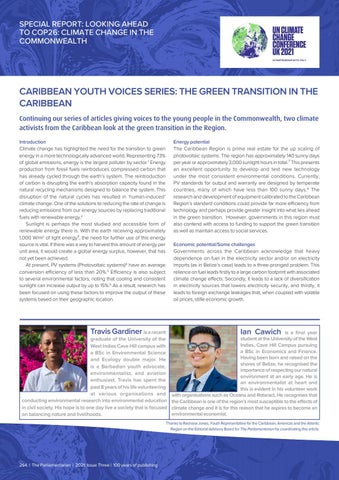SPECIAL REPORT: LOOKING AHEAD TO COP26: CLIMATE CHANGE IN THE COMMONWEALTH
CARIBBEAN YOUTH VOICES SERIES: THE GREEN TRANSITION IN THE CARIBBEAN Continuing our series of articles giving voices to the young people in the Commonwealth, two climate activists from the Caribbean look at the green transition in the Region. Introduction Climate change has highlighted the need for the transition to green energy in a more technologically advanced world. Representing 73% of global emissions, energy is the largest polluter by sector.1 Energy production from fossil fuels reintroduces compressed carbon that has already cycled through the earth’s system. The reintroduction of carbon is disrupting the earth’s absorption capacity found in the natural recycling mechanisms designed to balance the system. This disruption of the natural cycles has resulted in ‘human-induced’ climate change. One of the solutions to reducing the rate of change is reducing emissions from our energy sources by replacing traditional fuels with renewable energy.2 Sunlight is perhaps the most studied and accessible form of renewable energy there is. With the earth receiving approximately 1,000 W/m2 of light energy³, the need for further use of this energy source is vital. If there was a way to harvest this amount of energy per unit area, it would create a global energy surplus, however, that has not yet been achieved. At present, PV systems (Photovoltaic systems)4 have an average conversion efficiency of less than 20%.5 Efficiency is also subject to several environmental factors, noting that cooling and consistent sunlight can increase output by up to 15%.6 As a result, research has been focused on using these factors to improve the output of these systems based on their geographic location.
Travis Gardiner is a recent
Energy potential The Caribbean Region is prime real estate for the up scaling of photovoltaic systems. The region has approximately 140 sunny days per year or approximately 3,000 sunlight hours in total.⁷ This presents an excellent opportunity to develop and test new technology under the most consistent environmental conditions. Currently, PV standards for output and warranty are designed by temperate countries, many of which have less than 100 sunny days. 8 The research and development of equipment calibrated to the Caribbean Region’s standard conditions could provide far more efficiency from technology and perhaps provide greater insight into what lies ahead in the green transition. However, governments in this region must also contend with access to funding to support the green transition as well as maintain access to social services. Economic potential/Some challenges Governments across the Caribbean acknowledge that heavy dependence on fuel in the electricity sector and/or on electricity imports (as in Belize’s case) leads to a three-pronged problem. This reliance on fuel leads firstly to a large carbon footprint with associated climate change effects. Secondly, it leads to a lack of diversification in electricity sources that lowers electricity security, and thirdly, it leads to foreign exchange leakages that, when coupled with volatile oil prices, stifle economic growth.
graduate of the University of the West Indies Cave Hill campus with a BSc in Environmental Science and Ecology double major. He is a Barbadian youth advocate, environmentalist, and aviation enthusiast. Travis has spent the past 8 years of his life volunteering at various organisations and conducting environmental research into environmental education in civil society. His hope is to one day live a society that is focused on balancing nature and livelihoods.
Ian Cawich
is a final year student at the University of the West Indies, Cave Hill Campus pursuing a BSc in Economics and Finance. Having been born and raised on the shores of Belize, he recognised the importance of respecting our natural environment at an early age. He is an environmentalist at heart and this is evident in his volunteer work with organisations such as Oceana and Rotaract. He recognises that the Caribbean is one of the region’s most susceptible to the effects of climate change and it is for this reason that he aspires to become an environmental economist.
Thanks to Rashana Jones, Youth Representative for the Caribbean, Americas and the Atlantic Region on the Editorial Advisory Board for The Parliamentarian for coordinating this article.
264 | The Parliamentarian | 2021: Issue Three | 100 years of publishing



